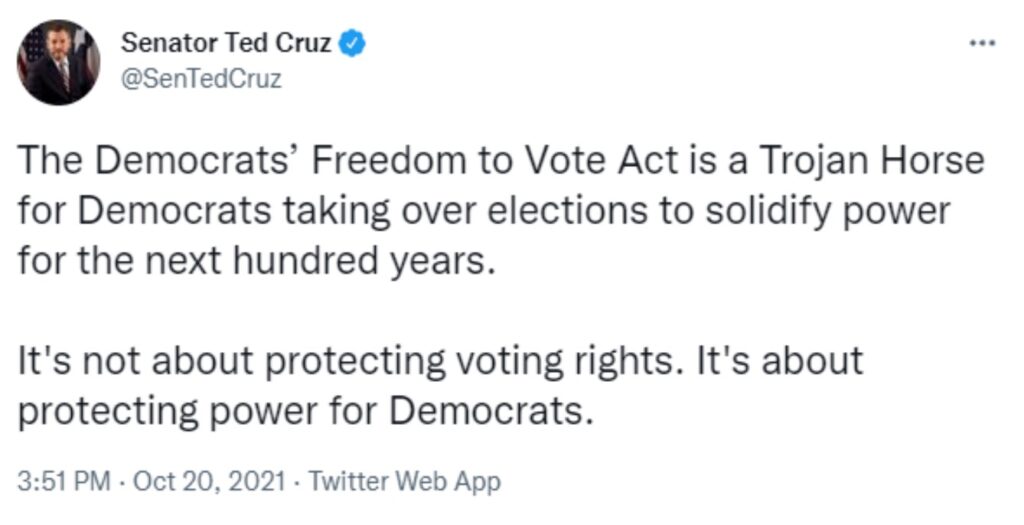By Mike Brand, Advocacy Director
Earlier this week, Senate Republicans filibustered the Freedom to Vote Act, a compromise bill aimed at getting Republican support. Unfortunately, the plan did not work.
The vote to begin debate on the bill was split 50-50 with all Senate Democrats voting to move the bill forward and all 50 Senate Republicans voting to block the bill. By filibustering the bill, Republicans didn’t block the bill from passing, they blocked the Senate from beginning debate about the bill. In doing so, Republicans were even blocking their opportunity to introduce amendments to the bill.
The Freedom to Vote Act, if it were passed, would make it easier to register to vote, allow voters to vote early and vote-by-mail, make Election Day a national holiday, end partisan gerrymandering, create standards for voter ID in states that have voter ID laws, prevent election subversion by increasing protections for local election officials and prevent their removal for political reasons, secure our elections by requiring voter-verified paper ballots, reliable audits, and voting system upgrades, close some dark money loopholes, and ensure digital ads have the same disclosure requirements that print, TV, and radio ads do.
It is frustrating that Republicans in Congress refuse to get behind these important and common-sense updates to our elections. One of the key issues is that Republicans continue to paint bills that would make access to the polls easier as some Democratic Party scheme to win elections.
Senator Ted Cruz tweeted this about the Freedom to Vote Act:
Which part of this bill does Senator Cruz believe will allow Democrats to solidify power? Is it the ban on partisan gerrymandering? Is it giving people more flexible voting options like early voting or vote-by-mail? Why do Senator Cruz and many other Republican members of Congress believe that expanding the vote would mean Democrats would win? If Republicans in Congress truly believed their ideas and their policies were better, wouldn’t they be confident that they could attract more voters with their message?
As former RNC Chairman Michael Steele said in our recent RAM Chat, “I’m all about expanding the vote because I’m not afraid of what I believe in.” He continued, “If you’re not afraid to make that expression of values and ideas as part of the national conversation in town squares around the country, then you’re not afraid of people voting.” It would seem that Cruz and others are very afraid of people voting. I wonder why.
In the wake of the 2020 election, instead of reshaping their message, looking to expand outreach and attract new voters, Republicans are doubling down on the big lie that the 2020 election was stolen and are working to restrict the right to vote. We’re seeing this happen across the country.
Republicans are attacking our elections in two key ways. In statehouses across the country, bills that would suppress the right to vote are being introduced and passed in record numbers. According to the Brennan Center, “at least 61 bills with restrictive provisions are moving through 18 state legislatures.” As of June of this year, “17 states enacted 28 new laws that restrict access to the vote.”
And beyond restricting access to the ballot box, Republicans are also trying to make it much easier to subvert our elections. According to Voting Rights Lab’s new report on election subversion, in this year alone, “more than 180 bills shifting election authority have been introduced.” Some of these bills would give partisan actors more authority in shaping the outcome of elections, give partisan poll watchers the ability to harass voters, give partisan state legislatures more power to overturn election results, criminally charge election workers for doing their jobs, and limit the authority and autonomy of election officials, among other things.
While Republicans at the state level are introducing these bills to restrict the right to vote and make election subversion much easier, Republicans in Congress are protecting their ability to do so by blocking bills like the Freedom to Vote Act and the John Lewis Voting Rights Advancement Act.
So, what happens now? Senator Schumer has said that the John Lewis Voting Rights Advancement Act will be brought up in the Senate as early as next week. If you have a Republican Senator, call their office, write them a message, tweet at them, urge them to support the Voting Rights Advancement Act.
While we will continue to push for support of this bill, sadly, it is unlikely that we will see a different result than we did with the Freedom to Vote Act. Republicans are likely to filibuster this bill just as they have filibustered other bills. That means Democrats have an important choice to make. Do they attempt to carve up these bills into much smaller bills and try to pass individual pieces of legislation tackling just one or two issues? Or do they amend or get rid of the filibuster entirely so that they can pass these priority bills through Congress?
There is little evidence to suggest that Republicans in the Senate are willing to pass any legislation that would protect the right to vote. So, they may force the Democrats’ hands in amending the filibuster. Time is running out. If the Democrats hope to pass voting rights legislation they will need to execute a strategy soon.

